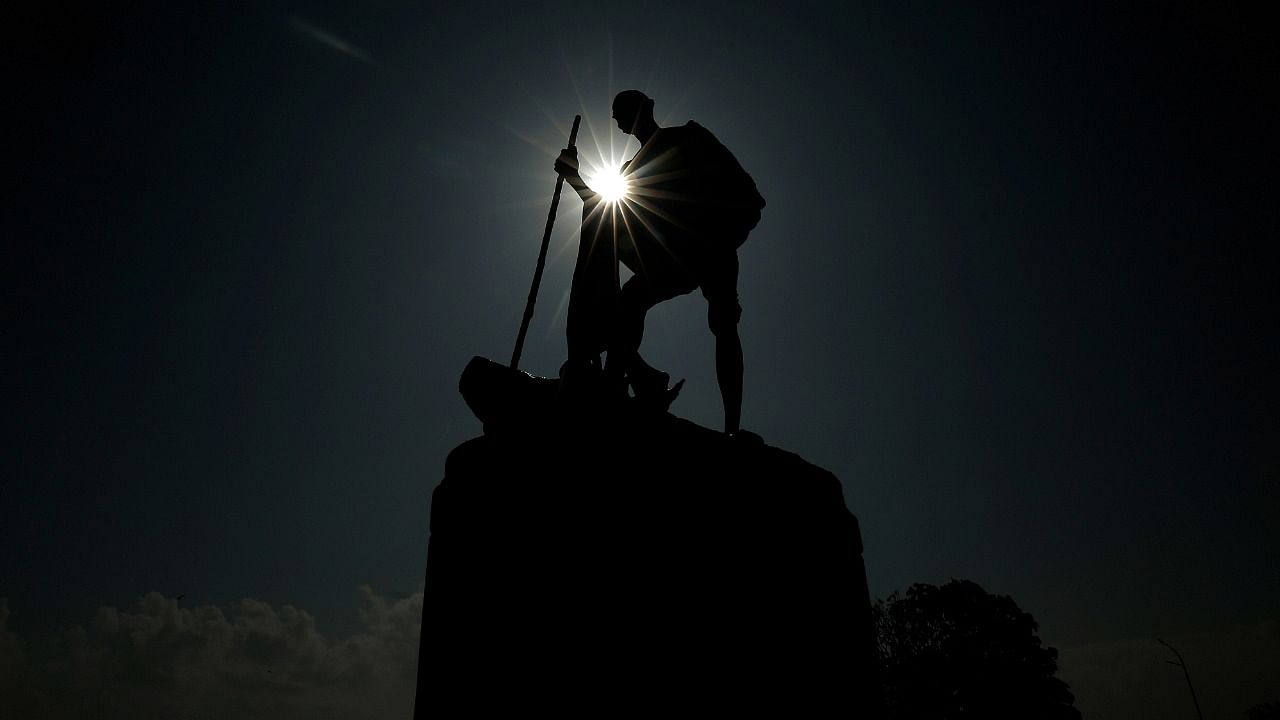
Gandhi believed in the dignity of labour and strongly felt that a few hours of mandatory manual labour every day is essential to inculcate self-reliance. Everybody knows of Gandhi’s profession — he was a lawyer, and of his spinning and weaving skills. We have also heard of his practice of cleaning his own and his guests’ bathrooms and toilets as he did not like the task being delegated to the members of a particular sect. But there were many ‘jobs’ that Gandhi tried his hand at and that made him a multi-tasker.
Tailor
In South Africa (SA), Gandhi was penalised with hard labour twice during imprisonment. Generally not supportive of machines, he was rather fond of the sewing machine that he used in the jails there. At the age of 74, while being detained in Aga Khan palace, Gandhi had stitched khadi handkerchiefs and neatly embroidered the jail superintendent’s initials and gifted them to him on his birthday.
Washer-man
While in SA, Gandhi laundered his barrister’s work clothes to cut expenses. He got a book to learn the art of washing and starching clothes and even taught its finer nuances to his wife Kasturba. He hated shabby, crumpled or torn clothes. He kept his loin-cloth, wrap and napkin — the only clothes he later used, spotlessly clean and un-creased.
Barber
In SA, Gandhi was thrown out of the train and refused a room in a hotel — all because of the colour of his skin. A barber refused to cut his hair for fear of losing his other customers. Deeply hurt, he tried cutting his own hair and in the process, messed up with the hair at the back of his head. When people laughed at his hairstyle in court the next day and teased him by asking if rats had nibbled at his hair, he replied, “No. The white barber refused to cut the black hair of a black man. So I decided to cut it myself, no matter how badly.”
This happened when he was 28 and cutting his own hair became a regular practice after this incident. Gandhi once suggested using the services of barbers in India to spread the Swadesi movement as they were known to be talkative and good at gossiping.
Cobbler
Gandhi learnt the craft of shoe-making from his devoted German friend Kallendach. At the age of 63, he made a pair of sandals for Vallabhbhai Patel when they were both imprisoned at Yeravda jail. He was good at tanning.
However, he used the hide of animals that died a natural death. Shoes and sandals made from such leather came to be known as ‘ahimsak chappals’. He had once presented a pair of hand-made sandals to General Smuts, who had jailed him in SA. On Gandhi’s 70th birthday, Gen. Smuts wrote, “In jail he prepared for me a pair of sandals. I have worn them for many a summer, though I feel that I am not worthy to stand in the shoes of so great a man.”
Cook
Gandhi learnt cooking at 18 while in England as he was tired of the insipid food served to him there. Thereafter, he cooked on many occasions.
Considering extravagant cooking a waste of time and labour, he prescribed a simple menu at his ashrams. He cooked for the satyagrahis from the Phoenix Settlement at the ashram.
Once when the number swelled to 2,500, because of the large quantities being cooked, either the dal would be too watery or the rice half cooked, but everybody ate without complaining, out of sheer love for their Bapuji.
Some odd samples of Gandhi’s menu were fresh neem leaf chutney (bitter as quinine), mixture of fresh nutritive oil-cake, curd, sweet sherbet made of tamarind and jaggery, boiled and mashed soya beans, salad made out of fresh greens, a pudding made from finely powdered baked chapattis, porridge of coarsely ground wheat and wheatened coffee.
While on board a ship to England, Gandhi wrote to his nephew, “Mixing 2 parts of banana and 1 part of wheat flour, we have made biscuits and rotis”. He could prepare cake, rice, dal, vegetable soup, salads, marmalade of both oranges and orange skins, bread without using yeast or baking powder, chapattis and fine khakras.
He was also a nurse to the sick, teacher to his wife, children and ashramites, farmer, journalist, author, printer and publisher and a very good auctioneer when it came to collecting funds for his numerous causes. The father of our nation was a man of many qualities!
(The author is a certified counsellor and children’s author)